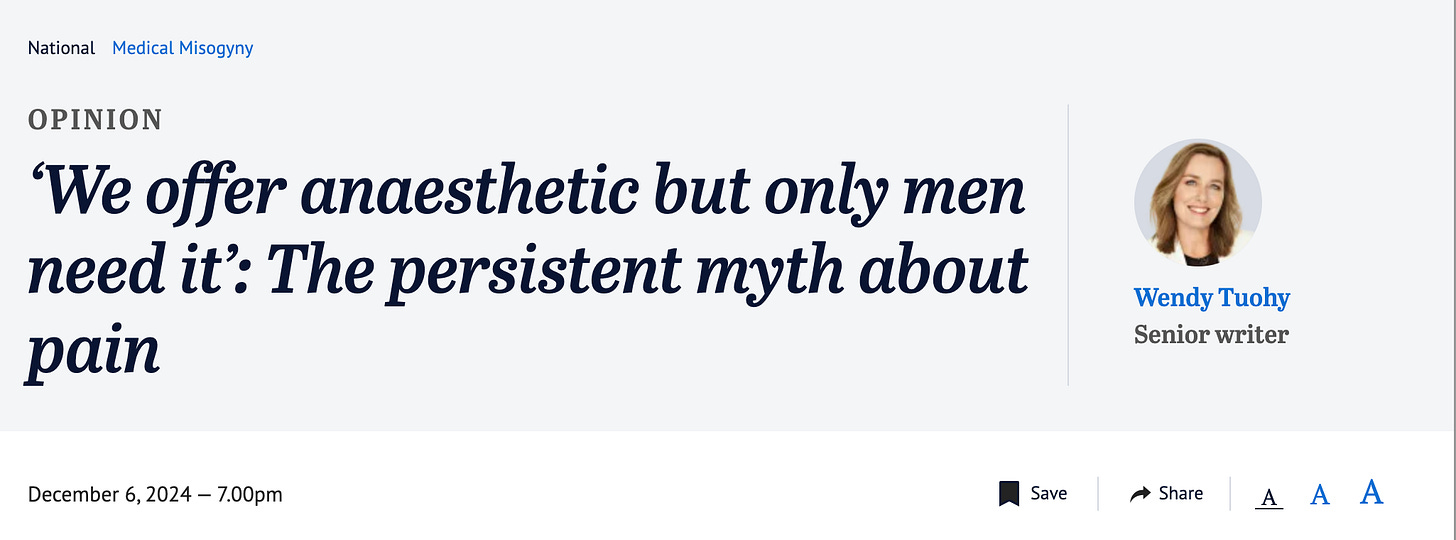The Retrievals Returns
A Podcast About Women’s Pain Is Still Relevant Two Years Later
Any time in the last two years that a conversation comes up about women’s pain, I ask if the person has ever listened to the podcast The Retrievals. Susan Burton’s Serial Podcast from 2023 sparked national awareness of the extent to which the cultural dismissal of women’s pain. The show won a Peabody Award.
For anyone who listened to The Retrievals, it’s painfully obvious how medical misogyny shows up in healthcare, not just in fertility care, but in every space where women seek medical attention.
Season 2 will be released this week on July 10, 2025. The 4-episode series covers ineffective pain treatment during cesarean sections.
Why The Retrievals Still Resonates Two Years Later
I wish that all it took was an incredibly well-researched and produced podcast to change medicine. But cultural change takes introspection and time. Pervasive stigma about women’s health, healthcare workers’ poor education of women’s pain, paired with the hidden curriculum of medical misogyny, fuels ongoing inadequate care for patients. While some progress has been made in the last two years in recognizing this issue, the losses in women’s health and safety have been overwhelming.
Women’s pain is often ignored, dismissed, and discounted by healthcare professionals. As an anesthesiologist, feminist, and patient, these are issues that matter to me. I want to keep discussing, exploring, and changing these beliefs in my profession.
In medicine, many clinicians still believe that women have a generally higher tolerance for pain than men. In a 2014 study of 2400 women with chronic pain, 90% of women reported feeling the healthcare system had discriminated against them, and 84% felt they were treated differently by doctors because they are women.
Women have been trained to tolerate more pain than men. If women do not perform pain as expected, we are labeled hysterical, overly dramatic, and liars. There is no shortage of patient testimony of how women’s pain continues to be dismissed by healthcare workers. In medicine, we often tell women, in ways overt and hidden, that their pain doesn’t matter.

This dismissiveness contributes to treatment bias and diagnostic delays. I know too many women whose pain was trivialized, and eventually they were found to have advanced cancer, cancers that could have highly treatable and even curable if they’d been taken seriously earlier. This same gender based mistreatment impacts gender diverse people, such as in trans broken arm syndrome.
The more we understand about medical misogyny, the better we can advocate for accurate and safe care at every clinical encounter. The Retrievals came out two years ago and continues to serve as a touchpoint for conversations around how women’s pain is chronically undervalued and dismissed.
Catching Up with The Retrievals
When the episodes first came out, I wrote an analysis of each one from my perspective as an anesthesiologist-ethicist.
Catch up on them before the new Season drops this week.
The Retrievals, Episode 2: The Nurse
A Yale nurse stole fentanyl meant for women undergoing IVF. Episode 2 of The Retrievals reveals the chilling betrayal—and the hidden epidemic of addiction in medicine.
The Retrievals, Episode 3: The Sentence
A nurse stole fentanyl meant for sedating IVF patients. She got four weekends in jail. The Retrievals Episode 3 raises big questions about justice, addiction, and whether prison is the answer.
The Retrievals, Episode 4: The Clinic
A nurse was able to take a purse full of fentanyl from the clinic and no one noticed. How could a trusted system fail in such a monumental way? Far from the failures of one nurse, explore how poor sedation practices and the cultural neglect of women’s pain enabled widespread harm at Yale’s fertility clinic.
The Retrievals, Episode 5: The Outcomes
What if your trauma didn’t count because you got pregnant? Episode 5 of The Retrievals dives into how medicine measures success—and erases it's failures.
The Retrievals Season 2
I’m still eagerly recommending that my students and trainees listen to the podcast, since it provides such an accessible and thoughtful analysis of how gender impacts the perception of women’s pain. The show gives many people a shared set of stories and language around what it feels like to be medically gaslit for seeking much needed and desired care.
I’m thrilled to see that The Retrievals is returning with another deep dive in Season 2 - this time into failed pain management during cesarean sections.
Season 2 of the Retrievals starts this week on July 10. I’ll be listening and sharing my thoughts with all of you.







